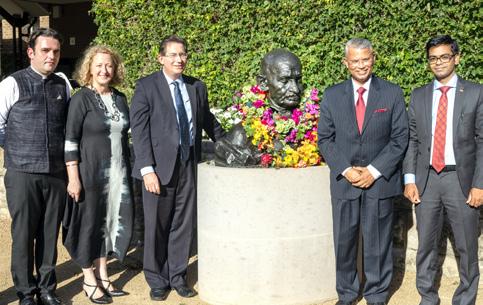
15 minute read
‘Do not succumb to apathy: choose hope’
from 2019-02 Sydney (2)
by Indian Link
Humanitarian and social justice campaigner Tim Costello
AO delivered UNSW’s annual Gandhi Oration this year
But it was clear that it was individual agency that was crucial to Costello. He ended his speech with a rousing quote from Gandhi himself: “In a gentle way you can shake the world with the power of your beliefs, with the power of your conviction, with your devotion to the invincible truth. Love and truth… are the only things worth living for.”
To do this, Costello concluded, “We must not succumb to apathy. We must choose hope: then, anything’s possible.”
The sentiment was the crux of Costello’s address.
In it, also, we find the very essence - and timelessness - of Mahatma Gandhi.
His own work in this regard is exemplary: he detailed the outcomes of projects undertaken by World Vison Australia in disaster management as well as transformational development worldwide and within Australia.
The government on the other hand, Costello noted, could be taking its responsibility much more seriously. The startling facts he shared with the audience resonated particularly strongly: “Australia’s foreign aid budget is a mere 0.22% of its gross national income, a record low in both our national history and in current OECD data.”
The Netherlands, he pointed out, sets aside 0.77%.
Talking of Gandhi’s espousal of nonviolence and its relevance in contemporary times, Costello said, “I believe, whatever purposes war achieved, it has now outlived all its uses.”
In this context, he derided the current government’s “credit facility for arms exporters to get us in the top ten of the world’s arms exporters – a credit facility equal to our aid budget.”
Over 80k persons donate for Pulwama martyrs through 'Bharat Ke Veer'
More than 80,000 persons have come forward since February 14 to contribute over Rs46 crore to the ‘Bharat Ke Veer’ corpus for the CRPF personnel killed in the Pulwama terror attack, the Indian government has said.
Over 40 troopers were killed and many more injured when an explosive-laden vehicle was rammed into a CRPF convoy in Pulwama on the Jammu-Srinagar highway on 14 February.
The ‘Bharat ke Veer’ website and mobile application was launched by Home Minister Rajnath Singh in April 2017. Bollywood actor Akshay Kumar was also involved in the initiative.
A total of Rs 46 crore has been collected and mostly disbursed under the initiative to the Central Reserve Police Force (CRPF) troopers who lost their lives in terrorist attacks, the government said.
Technically supported by National Informatics Centre (NIC) and powered by State Bank of India, the website and app allow anyone to financially support the brave hearts of their choice or donate to a general corpus. A person can donate a maximum of Rs 15 lakh to an individual trooper or the next of kin. If the amount exceeds Rs 15 lakh, the rest of the money is diverted towards the account of another trooper or the Bharat Ke Veer corpus.
The corpus is managed by a committee of eminent persons of repute and senior government officials who decide to disburse the fund equitably to the families of Central Armed Police Forces (CAPF) personnel on need basis.
The CAPFs are armed forces under the Union Home Ministry and comprise of Assam Rifles (AR), Border Security Force (BSF), Central Industrial Security Force (CISF), Central Reserve Police Force (CRPF), Indo-Tibetan Border Police (ITBP), National Disaster Response Force (NDRF), National Security Guard (NSG) and Sashastra Seema Bal (SSB).
India Inc offers support to Pulwama victims' kin
India Inc has come together to support the families of CRPF troopers killed and injured in the Pulwama terror attack, at a time when the central government is taking stern economic measures against Pakistan.
In the worst-ever attack in Jammu and Kashmir since militancy erupted in 1989, a suicide bomber rammed his SUV packed with explosives into a CRPF bus on the Srinagar-Jammu highway in Pulwama district, killing as many as 40 troopers and leaving many injured.
Soon after the attack, the government ended the 'most favoured nation' (MFN) status of Pakistan besides hiking customs duty to 200 per cent on all goods imported from the neighbouring country.
The National Stock Exchange of India (NSE) said it will contribute an amount equivalent to one day's salary of all its group employees to the ‘Bharat Ke Veer’ trust, set up by the government to support the families of the central armed police forces (CAPF) killed or injured in the line of duty.
Other companies such as the State Bank of India (SBI) too have announced special initiatives for the slain CRPF troopers.
"All the CRPF troopers were customers of the bank under the Defence Salary Package where the bank provides insurance of Rs 30 lakh to each of the defence personnel. The bank is taking steps to expedite release of insurance money to the next of kin of the martyred troopers," the SBI said in a statement.
"Twenty-three troopers had availed loans from the SBI. The bank has decided to waive all outstandings with immediate effect," it said.
The bank has also created a unified payments interface (UPI) for the ‘Bharat Ke Veer’ initiative to help people easily make monetary contributions.
SBI Chairman Rajnish Kumar said, "It is extremely distressing and disturbing to witness the loss of lives of soldiers who always stand for the safety of our country. In this moment of grief, our sincere thoughts are with the families of our brave hearts."
"These initiatives by the bank are a small gesture towards the families which have faced irreparable loss," he added.
The Reliance Foundation said it was ready to "assume full responsibility" for the livelihood of the Pulwama terror attack victims' families, besides taking care of the children's education and employment.
The foundation also said it was prepared to provide "the best possible treatment to the injured troopers."
"We shall also deem it to be our duty to shoulder any responsibility the government may place upon us in service to our beloved armed forces," it said in a statement.
Reliance Foundation is the philanthropic arm of Reliance Industries Ltd, headed by founder Nita Ambani.
In addition, Bharti Foundation, the philanthropic arm of Bharti Enterprises, has offered to bear the education expenses of the children of security personnel killed in the Pulwama attack.
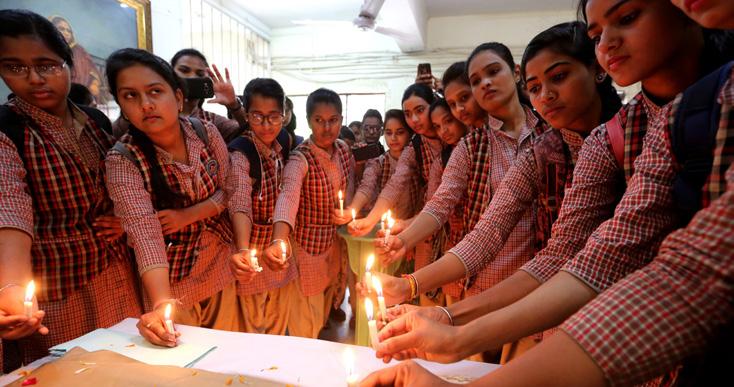
"Bharti Foundation will reach out to the individual families and bear all education related expenses for their children till they graduate from college," the foundation said in a statement.
Supreme Court to consider PIL on Article 370
The Supreme Court has said it would go into a PIL challenging Article 370 of the Constitution that gives special status to Jammu and Kashmir.
"Give mentioning memo to Registrar. We will see it," a bench headed by Chief Justice Ranjan Gogoi told petitioner Ashwini Upadhyay, advocate and a BJP leader, who mentioned the matter before the Bench.
The petitioner said the matter was of extreme national importance and should be heard on priority.
The public interest litigation (PIL) said the issues that court should decide are whether the powers of the President under the Article 370 are executive or legislative or constitutional and by virtue of nature of powers, whether there are any express limitation upon such powers while making any modification and in the matter of application of any Article to the state of Jammu and Kashmir.
The court should also decide whether the powers of the President under Article 370 are not co-extensive with the powers of Parliament and whether Article 35A, whereby the powers of Parliament to make law violating the fundamental rights have been transferred to the state legislature and such a law having been rendered non-justiciable under the central law is beyond the powers of the President to make modifications and restrictions under Article 370.
Upadhyay, in his plea, has contended the special provision was "temporary" in nature at the time of framing of the Constitution and Article 370(3) lapsed with the dissolution of the J&K Constituent Assembly on January 26, 1957.
The petition contended that Article 35A was "arbitrary" and "contrary" to various provisions that guarantee fundamental rights to citizens.
The plea also seeks a declaration from the apex court that the separate Constitution of J&K was "arbitrary" and "unconstitutional" on various grounds, including that it was against the "supremacy of the Constitution of India and contrary to dictum of 'One Nation, One Constitution, One National Anthem and One National Flag'".
"The Constitution of J&K is invalid mainly for the reason that the same has not yet got the assent of the President, which is mandatory as per provisions of the Constitution of India," the plea said.
Article 370 is a "temporary provision" with respect to J&K and restricts the applicability of various provisions of the Constitution by "curtailing" the power of Parliament to make laws on subjects which fall under the Union and Concurrent lists, it said.
Chandigarh's Rose Festival to be dedicated to CRPF martyrs
The Municipal Corporation Chandigarh has decided to dedicate the 47th Rose Festival to the CRPF troopers martyred in the Pulwama terror attack.
"It was unanimously decided that the whole festival will be dedicated to the nation. It was decided that patriotic songs and instrumental performances will be showcased during the event," a Corporation spokesman said.
The event will also see traditional competitions for children in simple functions including Rose Prince and Princess, display of photography competition, kite flying competition (in tricolour only), Rose Quiz and on-the-spot painting competition, he added.
"The savings from the Rose Festival's approved budget will be dedicated to the families of CRPF martyrs," the spokesman said. A cultural evening of patriotic songs and plays will be organised at the main stage of the Zakir Rose Garden in Sector 16, dedicated to the brave soldiers.
The Municipal Corporation has decided to set up an enclosure right in front of the entrance dedicated to the CRPF jawans who lost their lives in the Pulwama terror attack. It will enable the dignitaries and visitors coming to the Rose Garden to pay their tributes to the soldiers during the three-day event.
The Rose Festival is a popular annual event being organised in Chandigarh for the last 47 years.
The three-year-old son of slain soldier Tilak Raj watches as his father’s remains are brought back home to Dharamsala, India, 15 Feb 2019. Raj’s second son is four weeks old.
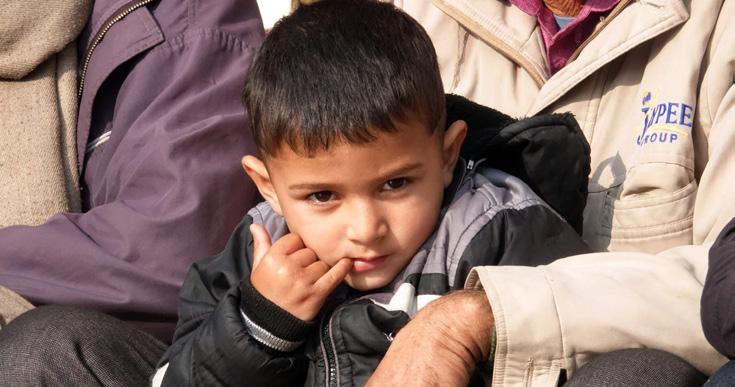
Telangana Police's face recognition tool reunites missing girl with family
Telangana Police's face recognition tool 'Darpan' has reunited a seven-year-old missing girl with her parents after two years.
The girl who went missing in January 2017 in Hyderabad was traced in Shahpur block of Madhya Pradesh's Betul district through 'Darpan'.
This was achieved by batch processing of photographs of missing persons in Telangana with persons found across the country, police said.
After getting the match, state CID traced her to the Ebenzer Education Society, an NGO.
The CID team informed the girl's parents and they rushed to Betul, where the girl was united with the family.
It was on January 4, 2017 that the missing case was registered at Bahadurpura police station in the old city of Hyderabad. It was later transferred to CID and its Women Protection Cell was investigating the case.
"This is the 18th case in which Darpan has united a missing person with his/her family through remotely processing images available in the public domain. This is an example of how artificial intelligence can be used to make things possible," said Additional Director General, CID, Govind Singh.
Last week, a 14-year-old special needs boy, who went missing from his house in Madhya Pradesh was traced in Bengaluru by 'Darpan'. The boy was handed over to his family.
Salman Shaik, a resident of Chiman Ganj Mandi police station limits in Ujjain, had left his house in June last. The boy was traced to Government Balak Ashram, Hossur Road in Bengaluru.
Indian product designed to stop bleeding poised to go global
A product to stop bleeding, made by an Indian company with extract from shellfish, is poised to become a global brand with its widespread use by the defence forces and hospitals in various countries besides Indian forces.
The first Indian haemostatic product to be approved by USFDA, Axiostat, manufactured by AxioBiosolutions, is gearing up to give multinationals a run for their money.
According to the company, all front-line
Indian defence and security forces are currently using the product, as well as forces of five other countries, mostly in the Middle East as its customers while trials are under underway for use by the military in three European countries.
The company, during last three-and-half years, has shipped 5 lakh units of Axiostat from its facility in Ahmedabad and is looking at doubling this number next year.
With majority of fatalities in road accidents occurring because of bleeding, axiostat can help saving the lives as it stops bleeding immediately. Surgeons are also finding the product useful in controlling the bleeding during surgeries, especially during cardiovascular surgeries.
So far the hospitals were using haemostats developed by multinationals with their price ranging between Rs 12,000 to Rs 20,000 for single use. Axiostat is available in India at onefifth of these prices, Axio founder and CEO, Leo Mavely told IANS.
Axiostat is available in 12 different variants designed for different applications. It is for dental use is priced at just Rs 30 while the one for dialysis patients it is available at Rs 50. The one used for military personnel costs Rs 2,000 and personnel of the Border Security Force, the Central Reserve Police Force, the Rashtriya Rifles, Greyhounds, Black Cat commandos and Para Commandos carry two of the variants in their field kit.
"We use a novel polymer called chitosan. Its unique property is that it is positively charged while the blood is negatively charged. When applied on bleeding injury, it becomes extremely sticky and stops bleeding. It was found it safe to use on all patients, even those with blood disorders," said Movely, a bioengineer.
Extracted from shellfish, Chitosan gives structural strength to its shell. The company extracts and purifies it for medical use.
The company has research collaboration with Harvard Medical School and Stanford Medical School. Dr Shiladitya Sengupta, Assistant Professor of Medicine at Harvard Medical School, has joined Axio as the chairman of Scientific Advisory Board.
The USFDA approval, coupled with collaboration of top US medical schools, is expected to help the company foray into US market. As US Army buys products made by US firms, Axio plans to float a US subsidiary for supplies to the army, hospitals and also over-the-counter sales.
Axio is currently exporting to 15 countries and the number is expected to double. "Primary market for us is conflict-hit countries in Middle East," the CEO said.
The haemostat market is estimated to be over $2.5bn globally. There are 4-5 companies worldwide who have succeeded in commercialising a haemostat capable of controlling arterial bleeding. However, unlike their products which carry protein and cause a reaction, Axiostat has no additives.
The equity investment in AxioBiosolutions so far has been $9.5 million including $7.4 million raised from Ratan Tata's UC-RNT along with Accel Partners, and IDG Ventures India.
University of Sydney partners with Indian B-Schools to offer Rs 25 million scholarships
The University of Sydney has announced a partnership with the Tata Institute of Social Sciences (TISS), Tech Mahindra and the Indian Institute of Technology (IIT) Bombay to provide scholarships worth more than Rs25 million to Indian students.
The scholarship scheme aims to help discover India's next leaders and the "one idea that will bring positive change to the country".
"We live in a globalised world and when our students enter the workforce, they will have to work with colleagues, clients and stakeholders from around the world," Michael Spence, Vice-Chancellor and Principal at the University of Sydney, said in a statement.
"The best way for us to give them the intercultural and interpersonal skills they need for their future careers is to ensure that they have international experience as part of their degrees," Spence added.
The scheme includes three scholarships of approximately Rs 2.5 million each for undergraduate students paid over the duration of any undergraduate degree up to four years; 10 first-year scholarships of approximately Rs 1 million each for undergraduate and postgraduate students; and 15 first-year scholarships of approximately Rs 500,000 each for undergraduate and postgraduate students.
It is open to applicants who are Indian citizens currently residing in India and applying for an undergraduate or postgraduate coursework degree at the University of Sydney.
The University's TISS partnership will look at real-world projects, developed and managed by both universities' academic staff, focusing on economic development, environmental sustainability and social inequality.
With Tech Mahindra, the varsity has signed a Memorandum of Understanding (MoU) aimed at allowing student groups to work with an academic supervisor and industry experts on problems around Artificial Intelligence (AI), Machine Learning, virtual reality, augmented reality, and the Internet of Things (IoT).
With IIT Bombay, the University will facilitate the mobility of doctoral students between the two institutions -- with research projects focusing on a broad range of areas including nanoscale science and technology.
Abu Dhabi adds Hindi as third language
In Courts
The Abu Dhabi Judicial Department (ADJD) has added Hindi as the third official language to be spoken in the city's courts, alongside Arabic and English.
According to the ADJD, this step was aimed at helping foreigners to learn about litigation procedures, their rights and duties without a language barrier, in addition to facilitating registration procedures via unified forms available through the Department's website, The Khaleej Times reported.
"The adoption of multilingual interactive forms for claim sheets, grievances and requests, aims to promote judicial services and increase the transparency of litigation procedures," Yousef Saeed Al Abri, undersecretary of the ADJD, said.
"This is in addition to facilitating registration procedures to the public through simplified and easy forms and raising litigants' legal awareness via interactive forms of the statements of claims, to ensure access to the legal materials related to the subject of the dispute."
Al Abri explained that the adoption of new languages comes as part of the bilingual litigation system, the first phase of which was launched in November 2018, through the adoption of procedures requiring the plaintiffs to translate case documents in civil and commercial lawsuits into English, if the defendant is a foreigner.
Of the United Arab Emirates' population of over 9 million people, 88.5 per cent are expatriate workers, according to official figures.
Indians account for 38 per cent of the population. IANS
At its inaugural conference
Elevate 2019 held in February, the Young Sikh Professionals Network (YSPN) explored the concept of sewa in a rapidly changing world.
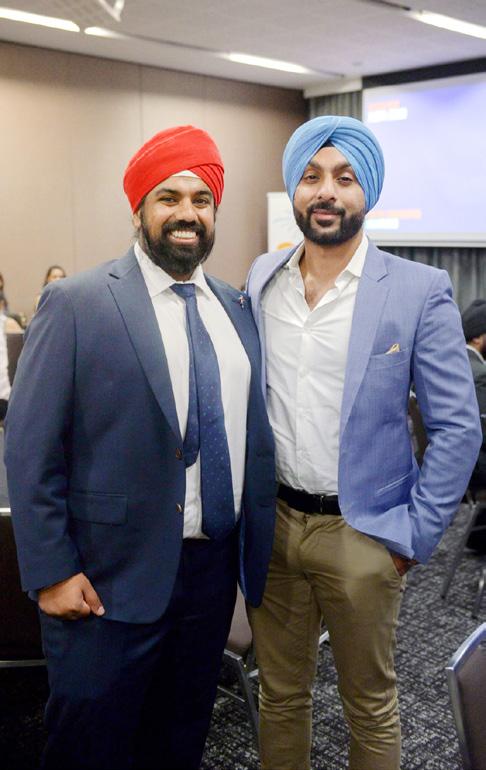
Hosting what was described as the “largest gathering of Sikh professionals globally”, YSPN made sure the atmosphere was buzzing - with 165 local members, interstate visitors and international panellists coming together to dissect current trends and share stories of what it means to be Sikh in the working world.
Sewa, which means ‘to serve’, is a core principle of Sikhism. Chair Ramneek Singh launched the day by challenging the idea that sewa is just serving langar and doing dishes at the gurudwara once a week.
Sikhs have a proud history of driving the community forward, he said, so what does sewa mean in today’s world?
The theme was unpacked through five panel discussions, beginning with a session on the migration and development of Australia’s Sikh community. Harjit Singh, one of the co-founders of the Australian Sikh Heritage Association had the audience chuckling when he fondly referred to the community as “members of a gang”. When asked on their views about the future of the community, the panellists remarked that there is still a long way to go for the wider community to understand what a Sikh is. The audience was challenged to broaden the scope of sewa to create a more visible community.
The business and politics panels both discussed the practice of sewain professional and personal circumstances. Most of the panellists had a similar notion: that daily gestures of reaching out to your colleagues or community were forms of sewa in the modern world. Vivek Bhatia, Chief Executive Officer of QBE Insurance Group, emphasised that “sewa is not what we do on the side, it’s what we do on a day-to-day basis”. Politics itself is a form of modern day sewa, in reaching out to the community regularly.
Sikh roles in politics are becoming more prominent. Australia’s first Sikh councillor John Arkan of Coffs Harbour, stated, “In Australian history, we are entering a new era, an era of inclusion with the sight for more women and more Sikhs in parliament.”
It was the former Singapore MP, Inderjit Singh’s words that hammered in the final nail of inspiration. “In India, we are a minority. Here, we are a minority within a minority. Yet, we still make an impact.”
The panel that elicited the most laughter from the audience was the entrepreneurship panel. With four diverse guests speaking about their experiences in creating businesses under the teachings of Sikhism, the panel was sure to be a hit. But it was Simran Gambhir, the Director of Ganemo Group, who had the room in splits with his brutal honesty regarding start-up businesses. His quips ranged from “Balance is an unattainable goal as an entrepreneur”, to “Mentorship? That’s just old people telling you what they got wrong when they did it. So don’t get a mentor.”
However, the panel connected their passion to something more than just personal goals. They explained that being an entrepreneur is built into the very DNA of Sikhs. Being an entrepreneur is a sewa of its own.
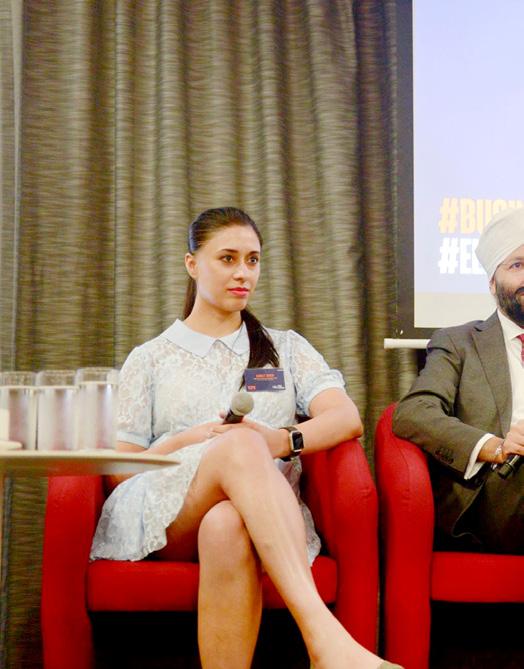
For a conference aimed at the youth, there were few young panellists on stage. It would have been interesting to see what earlycareer professionals have to say on some of these matters.
However, the event was certainly successful in inspiring the audience to reconsider and extend the notion of sewa in their contemporary lives. With the bar set high, we can’t wait to see what the conference brings next year.
Sahibnoor Singh and Devna Luthra
YSPN was formed in 2012 with the aim of empowering young Indian diaspora in the workforce by providing mentorship, developing networks and building advocacy in the Sikh and Aussie professional communities.
To learn more, visit www.yspn.org.au








